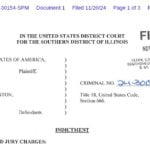DuPage Township (ECWd) –
Q: When Township Supervisor resigns, who signs checks?
A: Nobody. (is the short answer)
Q: Then how do the township bills and payroll get paid?
A: They don’t get paid until the vacancy is filled.
Such is the dilemma in DuPage Township after their now-former Supervisor William Mayer tendered his resignation last month.
The same issue arose last year in Shelbyville Township, located in Shelby County. Their Supervisor resigned and no checks could be written until the lapse of 60 days for the township electors to call a meeting and appoint a Supervisor. Previous attempts by the board for appointing a supervisor failed, which is why the 60-day clock was used.
A resignation, in Illinois, is effective upon delivery, or on the date or action specified in the resignation. It cannot be withdrawn after it has been delivered to the appointing authority (even if the effective date has not arrived).
Until a new Supervisor is appointed, either by the Township Board at any meeting they so choose to call for that purpose, or, at the expiration of 60 days after the effective date of the resignation when the Township Electors shall call a meeting to appoint a Township Supervisor, no person may take any actions to pay any bills or sign any checks as that duty is reserved exclusively for the Supervisor.
- no checks can be signed – payroll, emergency assistance, general assistance, regular invoice bills, or any other expenditure
- no other actions on behalf of the township, in the name of the supervisor, may be taken until an appointment is made to the vacancy
There is no provision in Illinois law permitting anyone other than the Supervisor to sign checks.
We understand payroll for this pay period has been paid, we believe it should not have been paid since there is no Supervisor and the former Supervisor could not have legally post-dated any payments (or warrants for payments).
Some have the belief that since check payments may constitute a “public convenience” (emergency assistance, payroll, etc) then it is OK for the supervisor no longer in office to continue making payments until a person is appointed to his vacant position. Wrong answer.
The “public convenience” stems from an Illinois Supreme Court case from the 1800s, and since then, we have a new constitution, new statutes, and new case law replacing that decision.
- Township Code Section 60-5 states that resignations create a vacancy in the office. It further states that if any township office becomes vacant due to a “physical incapacity” of any township officer, such board may temporarily appoint a Deputy to perform the ministerial functions of said officer. In the case with DuPage Township – the vacancy was due to resignation, not due to any physical incapacity, therefore, no such temporary appointment is permitted.
- Township Code section 60-20 states that the board “may” accept the resignation of any officer and that resignations become effective upon acceptance by the township board.
- Section 25-2 of the Election Code states that upon a resignation, the resigning officeholder may continue to hold such office until the date or event specified in such resignation. Mayer’s resignation specified a date of January 22, 2019. Additionally, the Board accepted his resignation on January 29, 2019. Once he is no longer in office, he cannot perform any function of that office.
- Current case law on resignations and public convenience mandate that affirmative action be taken by the recipient of the resignation, otherwise there is no recourse based upon public convenience: “In the event the right of creditors or public convenience require that there should be no vacancy in the office from which the incumbent seeks to resign, then affirmative action is required of the officer receiving the resignation in order to preclude it from becoming effective. Absent such affirmative action, the resignation becomes effective either forthwith or 472*472 upon the future date specified therein, as the case may be, when received by or filed with such officer, and it cannot be withdrawn.”
The key words in this decision: “require that there should be no vacancy” – would effectively prohibit the resignation, and Illinois law provides for no such prohibition of resignation for any office in this state. There is, however, an Illinois Supreme Court case from 1978 (Chicago ex rel. Martin-Trigona v. O’MALLEY) where “affirmative action” was taken, which rendered the resignation void.
What happens if the former Supervisor writes checks or affect any distribution of public funds after his resignation became effective?
We believe it would be a crime for him to act in such a fashion. We believe it would be an unlawful act and that it would constitute forgery at the very least.
It is important to remember that this resignation was not very well thought out, at least as to the consequences of their under-handed effort to unlawfully appoint township trustee Burgess to the vacated township supervisor position.








4 Comments
Pet
Posted at 13:31h, 05 FebruaryI hope they don’t have any debt payments due.
Cindy
Posted at 07:44h, 03 FebruaryThe laws are way too convoluted. Not even the supposed enforcers of the laws are able to understand them. What hope is there? Integrity would be those that run for these offices actually read and adhere to the laws; and if not then be held accountable. Sauce for the goose anyone?
jan shaw
Posted at 19:56h, 02 FebruaryThis is why it is important for all elected officials to read, understand and follow the law. After all it is the LAW, not merely a suggestion.
SMH
Posted at 19:36h, 02 FebruaryLast week it was a felony, this week it’s possible forgery. This is too much. The supervisor screwed them all while he was there and even on the way out. Did he set up the to other two trustees to look bad on purpose?